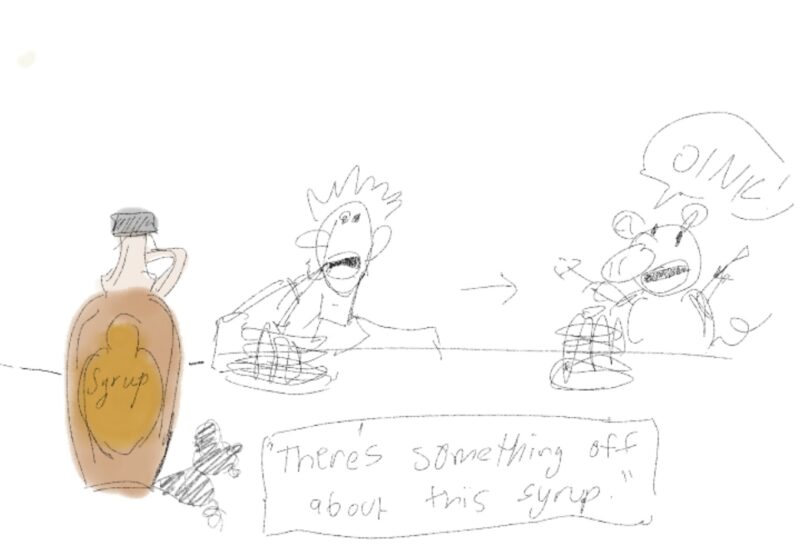When is a debate not a debate? That was all I could think of as I left the discussion of “The Passion” this past Thursday night. If you missed it, there was a panel discussion led by Dean Green on “Jesus, The Passion and History” held at the Interfaith Chapel. This was a perfect discussion to have at this university, especially when tied to one of the most successful religious films of all time. At the outset it looked like it was going to be a good discussion. You had enough diversity for a “walk into a bar” joke – with a secular teacher, a Roman Catholic priest and a Baptist minister – and the setting was both warm and intimate. However, with the same foreboding that we all get when we read about tuition increases – “More speed bumps?” – I had a feeling this wasn’t going to live up to my expectations. After a nice introduction our “discussion” started. I put discussion in quotes because that’s exactly what it wasn’t. When I think of a discussion I think of an interplay of diverse ideas where the audience leaves more aware of all the issues involved. A discussion, therefore, facilitates the audience making up its own mind based on what was said. What occurred on Thursday was not a discussion, but a lecture.Anne Merideth, an assistant professor of Religion at UR, got up and proceeded to trash Mel Gibson’s film for lack of accuracy in it and pointed out discrepancies between the Gospels. Perfectly fine argument, and one that many have made. Next up was William Herzog, a Baptist minister from the Colgate Divinity School, who proceeded to “trash Mel Gibson’s film for lack of accuracy” and imply it was anti-Semitic. All right, also a valid view, I wonder what the priest had to say. Curt Cadorette, a John Henry Newman Professor of Roman Catholic Studies, got up and stated that Gibson’s film was awful and that Gibson himself was a bit of a loony. I never believed in dj vu until that night.Let’s recap, shall we? If you went to this discussion you would leave knowing that – the film is awful, most likely anti-Semitic, and the Gospels ain’t too great either. Well, glad the audience could go away with lots to think about – provided they had to agree with the panel. Now, in the interests of full disclosure, I will state that I am a believer in Jesus Christ and thought “The Passion” was a powerful and engaging movie. I don’t consider the film canon, and in that regard agree with the panel that there were artistic licenses taken by Gibson, but I still feel it to be a wonderful movie that can have a great impact. So yes, as I write this I realize I am biased. However, considering I’m in good company with the thousands who have gone to see the film, would it have been that hard for the university to find someone who didn’t present a grievance with the film? Out of all the scholars and all the preachers that the university could contact, it only managed to find three people who agreed with each other? Is a discussion only supposed to be three scholars imparting to the masses how we should think? My annoyance with what occurred on Thursday isn’t so much on what was said, though I disagree, but that there were no panelists presenting an alternate view. Was our university so lax it didn’t bother to ask these panelists what they were going to say? I highly doubt that. That leads to the more troubling question of if the university cared that the three panelists agreed and just didn’t want an alternate position presented. I don’t know what went on in selecting the panelists so of course I can’t be sure, however it is a poor mark for any “discussion” when you can even think of that possibility.At the end of the discussion Green commented that if anyone ever wondered why the Interfaith Chapel was created, it was for this reason. I assume he meant that it allowed for a great discussion of religious views, which helped build understanding and toleration. I agree that something like that would have been a wonderful thing to behold and be a part of, but that is not what occurred. Unfortunately, what was presented had none of those qualities. I think what most galled me was the wasted opportunity. If nothing else, “The Passion” has sparked a great reawakening in exploring the Bible and Jesus’ life. Many people have come away from the film with many questions that should be answered. This university had a wonderful opportunity to not only add to the public discourse, but also educate many people. The fact that it squandered that chance, with a “discussion” that was nothing more than a group of people putting out one view, is truly sad. Clemm can be reached at rclemm@campustimes.org.
othello
CT Watches: Othello
The University of Rochester Theatre Program takes on a modern interpretation of Shakespeare’s “Othello” and does an excellent job of…
criticism
Israel Week promotes nationalism within our Jewish life on campus
The purpose and effect of hosting an “Israel Week” is to distract from and distort the historical and contemporary realities of Israeli occupation and apartheid.
British “people”
Available now, for a limited time: Pig Syrup
The fact that this market hasn’t been tapped yet astounds me. There are so many reasons to transform into a pig!




